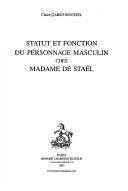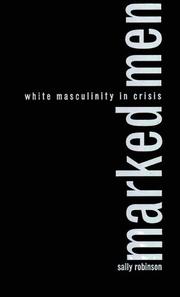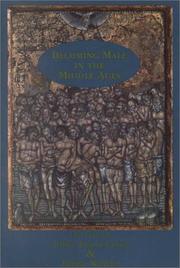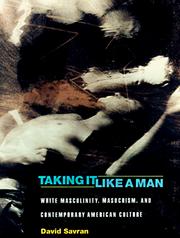| Listing 1 - 10 of 42 | << page >> |
Sort by
|

ISBN: 2745306472 Year: 2002 Volume: 70 Publisher: Paris Honoré Champion Editeur
Abstract | Keywords | Export | Availability | Bookmark
 Loading...
Loading...Choose an application
- Reference Manager
- EndNote
- RefWorks (Direct export to RefWorks)
Men in literature --- Masculinity in literature --- Hommes dans la littérature --- Masculinité dans la littérature --- Staël, --- Hommes dans la littérature --- Masculinité dans la littérature --- Staël,
Book
ISBN: 9888754777 9789888754779 Year: 2022 Publisher: Hong Kong : Hong Kong University Press,
Abstract | Keywords | Export | Availability | Bookmark
 Loading...
Loading...Choose an application
- Reference Manager
- EndNote
- RefWorks (Direct export to RefWorks)
Masculinity, fast-changing and regularly declared to be in the throes of crisis, is attracting more popular and scholarly debate in China than ever before. At the same time, Chinese literature since 1989 has been characterized as brimming with countercultural 'attitude'. This book probes the link between literary rebellion and manhood in China, showing how male writers, as they critique the outcomes of decades of market reform, also ask the same question: how best to be a man in the new postsocialist order?In this first full-length discussion of masculinity in post-1989 Chinese literature, Pamela Hunt offers a detailed analysis of four contemporary authors in particular: Zhu Wen, Feng Tang, Xu Zechen, and Han Han. In a series of insightful readings, she explores how all four writers show the same preoccupation with the figure of the man on the edges of society. Drawing on longstanding Chinese and global models of maverick and marginal masculinity, and responding to a desire to retain a measure of masculine authority, their characters all engage in forms of transgression that still rely heavily on heteronormative and patriarchal values. Rebel Men argues that masculinity, so often overlooked in literary analysis of contemporary China, continues to be renegotiated, debated, and agonized over, and is ultimately reconstructed as more powerful than before.
Hommes dans la litterature. --- Masculinite dans la litterature. --- Men in literature. --- Masculinity in literature. --- Zhu, Wen, --- Han, Han, --- Xu, Zechen, --- Feng, Tang, --- Criticism and interpretation.

ISBN: 0231112920 9780231112925 0231112939 9780231112932 023150036X Year: 2000 Publisher: New York Columbia University Press
Abstract | Keywords | Export | Availability | Bookmark
 Loading...
Loading...Choose an application
- Reference Manager
- EndNote
- RefWorks (Direct export to RefWorks)
White men still hold most of the political and economic cards in the United States; yet stories about wounded and traumatized men dominate popular culture. Why are white men jumping on the victim bandwagon? Examining novels by Philip Roth, John Updike, James Dickey, John Irving, and Pat Conroy and such films as Deliverance, Misery, and Dead Poets Society-as well as other writings, including The Closing of the American Mind-Sally Robinson argues that white men are tempted by the possibilities of pain and the surprisingly pleasurable tensions that come from living in crisis.
Psychological study of literature --- Thematology --- Sociology of culture --- United States --- Men, White --- Masculinity --- Men in popular culture --- Men in literature. --- Blancs --- Masculinité --- Hommes dans la culture populaire --- Hommes dans la littérature. --- Masculinity. --- Men in popular culture. --- Men, White. --- United States. --- White men. --- Gender & Ethnic Studies --- Social Sciences --- Gender Studies & Sexuality --- United States of America
Book
ISBN: 9782842923457 2842923456 Year: 2012 Volume: *4 Publisher: Saint-Denis Presses universitaires de Vincennes
Abstract | Keywords | Export | Availability | Bookmark
 Loading...
Loading...Choose an application
- Reference Manager
- EndNote
- RefWorks (Direct export to RefWorks)
During the Belle Epoque real novelists who wrote with originality, boldness and lucidity. Today famous or fallen into oblivion, sometimes hidden under a male pseudonym, they fashioned numerous figures of the opposite sex: father, husband, lover, son, man-object predator, patriarch, seducer, enemy, executioner, mentor ... Prince Charming. This book testifies to the environment. Result of a series of studies with finesse conducted by an international team of specialists, it revives the "paper men" imagine past by nine women writers: Therese Bentzon, Colette, Louise-Marie Compain, Lucie Delarue-Mardrus Daniel Lesueur, Anna de Noailles, Georges Peyrebrune Rachilde and Marcelle Tinayre. This work invites the reader to discover how these authors transgressed subtly Panegyrists discourses of masculinity.
French literature --- Masculinity in literature. --- Men in literature. --- Littérature française --- Masculinité dans la littérature --- Hommes dans la littérature --- History and criticism. --- Women authors --- Histoire et critique --- Femmes écrivains --- 1800 - 1999 --- Littérature française --- Masculinité dans la littérature --- Hommes dans la littérature --- Femmes écrivains

ISBN: 3487090953 Year: 1988 Volume: 29 Publisher: Hildesheim,New York : G. Olms,
Abstract | Keywords | Export | Availability | Bookmark
 Loading...
Loading...Choose an application
- Reference Manager
- EndNote
- RefWorks (Direct export to RefWorks)
German literature --- Men in literature --- Littérature allemande --- Hommes dans la littérature --- Women authors --- History and criticism --- Ecrivaines --- Histoire et critique --- -German literature --- -Men in literature --- -History and criticism --- Littérature allemande --- Hommes dans la littérature --- Women and literature --- Women authors&delete& --- History
Book
ISBN: 0312035659 Year: 1991 Publisher: London Vision Press
Abstract | Keywords | Export | Availability | Bookmark
 Loading...
Loading...Choose an application
- Reference Manager
- EndNote
- RefWorks (Direct export to RefWorks)
Men in literature --- Women and literature --- Hommes dans la littérature --- Femmes et littérature --- History --- Histoire --- Wharton, Edith, --- Characters --- Men --- Criticism and interpretation --- Personnages --- Hommes --- Critique et interprétation --- Hommes dans la littérature --- Femmes et littérature --- Critique et interprétation --- Men. --- Criticism and interpretation.

ISBN: 0815337701 Year: 2000 Publisher: New York, NY : Garland,
Abstract | Keywords | Export | Availability | Bookmark
 Loading...
Loading...Choose an application
- Reference Manager
- EndNote
- RefWorks (Direct export to RefWorks)
Masculinity (Psychology) --- Civilization, Medieval. --- Men in literature. --- Civilisation médiévale --- Hommes dans la littérature --- History --- Masculinité (psychologie) --- Hommes --- Histoire --- Dans la littérature --- Abélard, Pierre, --- Chaucer, Geoffrey, --- Masculinité --- Masculinity --- Civilisation médiévale --- Hommes dans la littérature --- History. --- Civilisation médiévale. --- Histoire. --- Dans la littérature. --- Abélard, Pierre --- Lindsay (david), 1876-1945

ISBN: 0691058768 0691016372 9786612753367 1400813271 1400822467 1282753363 9781400822461 9781400813278 9780691058764 9780691016375 9781282753365 6612753366 140080700X 1400806984 Year: 1998 Publisher: Princeton, N.J. Princeton University Press
Abstract | Keywords | Export | Availability | Bookmark
 Loading...
Loading...Choose an application
- Reference Manager
- EndNote
- RefWorks (Direct export to RefWorks)
From the Beat poets' incarnation of the "white Negro" through Iron John and the Men's Movement to the paranoid masculinity of Timothy McVeigh, white men in this country have increasingly imagined themselves as victims. In Taking It Like a Man, David Savran explores the social and sexual tensions that have helped to produce this phenomenon. Beginning with the 1940's, when many white, middle-class men moved into a rule-bound, corporate culture, Savran sifts through literary, cinematic, and journalistic examples that construct the white man as victimized, feminized, internally divided, and self-destructive. Savran considers how this widely perceived loss of male power has played itself out on both psychoanalytical and political levels as he draws upon various concepts of masochism--the most counterintuitive of the so-called perversions and the one most insistently associated with femininity. Savran begins with the writings and self-mythologization of Beat writers William Burroughs, Allen Ginsberg, and Jack Kerouac. Although their independent, law-defying lifestyles seemed distinctively and ruggedly masculine, their literary art and personal relations with other men in fact allowed them to take up social and psychic positions associated with women and racial minorities. Arguing that this dissident masculinity has become increasingly central to U.S. culture, Savran analyzes the success of Sam Shepard as both writer and star, as well as the emergence of a new kind of action hero in movies like Rambo and Twister. He contends that with the limited success of the civil rights and women's movements, white masculinity has been reconfigured to reflect the fantasy that the white male has become the victim of the scant progress made by African Americans and women. Taking It Like a Man provocatively applies psychoanalysis to history. The willingness to inflict pain upon the self, for example, serves as a measure of men's attempts to take control of their situations and their ambiguous relationship to women. Discussing S/M and sexual liberation in their historical contexts enables Savran to consider not only the psychological function of masochism but also the broader issues of political and social power as experienced by both men and women.
Hommes dans la culture populaire --- Hommes dans la littérature --- Mannen in de literatuur --- Mannen in de volkscultuur --- Men in literature --- Men in popular culture --- Psychological study of literature --- Sociology of culture --- United States --- Reverse discrimination --- Masochism --- Men in literature. --- Masculinity --- Men, White --- Discrimination --- Psychic masochism --- Paraphilias --- Personality disorders --- Sadomasochism --- Suffering --- Popular culture --- White men --- United States of America
Book
ISBN: 9781032065656 1032065656 Year: 2022 Publisher: New York : Routledge, Taylor & Francis Group,
Abstract | Keywords | Export | Availability | Bookmark
 Loading...
Loading...Choose an application
- Reference Manager
- EndNote
- RefWorks (Direct export to RefWorks)
"This book focuses on the projection of the hero's masculinity in a selection of post-millennial popular romance narratives and attempts to discover if, and to what extent, this projection reinforces or challenges patriarchal ideas about gender. In the majority of these narratives the hero is often presented as a hegemonic alpha male. However, hegemonic masculinity is not a fixed concept. Rather, it is subject to continuous change which allows for the emergence of various dominant masculinities. Under a poststructuralist lens and through a close textual analysis approach and a gender reading of romance narratives, the book suggests that to a certain extent the romance hero could be described as a platform onto which different forms of dominant masculinity are displayed and highlights that these masculinities do not necessarily clash, depend on, or function as a prerequisite for each other"--
Heroes in literature. --- Hommes dans la littérature. --- Héros dans la littérature. --- Masculinity in literature. --- Masculinité dans la littérature. --- Men in literature. --- Paralittérature --- Popular literature --- Popular literature. --- Romance fiction --- Romance-language fiction. --- Rôle selon le sexe dans la littérature. --- Sex role in literature. --- Histoire et critique --- History and criticism --- History and criticism. --- 2000-2099.
Book
ISBN: 2228894508 9782228894500 Year: 2001 Volume: 409 Publisher: Paris: Payot,
Abstract | Keywords | Export | Availability | Bookmark
 Loading...
Loading...Choose an application
- Reference Manager
- EndNote
- RefWorks (Direct export to RefWorks)
French fiction --- Men in literature --- Sex role in literature --- Masculinity in literature --- Roman français --- Hommes dans la littérature --- Rôle selon le sexe dans la littérature --- Masculinité dans la littérature --- History and criticism --- Histoire et critique --- Masculinite dans la litterature --- Feminisme dans la litterature --- Differences entre sexes (Psychologie) dans la litterature --- Role selon le sexe dans la litterature --- Hommes dans la litterature --- Hommes --- Ecrits d'hommes francais --- Litterature francaise --- Identite --- Themes, motifs --- Roman français --- Hommes dans la littérature --- Rôle selon le sexe dans la littérature --- Masculinité dans la littérature --- Male authors --- Hommes - Identite --- Ecrits d'hommes francais - Histoire et critique --- Litterature francaise - 19e siecle - Themes, motifs --- Litterature francaise - 20e siecle - Themes, motifs --- French fiction - 19th century - History and criticism --- French fiction - 20th century - History and criticism --- French fiction - Male authors - History and criticism
| Listing 1 - 10 of 42 | << page >> |
Sort by
|

 Search
Search Feedback
Feedback About UniCat
About UniCat  Help
Help News
News